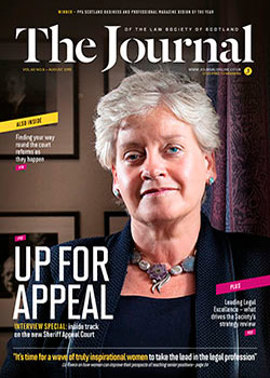Scottish Solicitors Discipline Tribunal
Murray Alexander McAuley
A complaint was made by the Council of the Law Society of Scotland against Murray Alexander Thomas McAuley, solicitor, Coatbridge. The Tribunal found the respondent guilty of professional misconduct in cumulo in respect of his failure (a) to respond to correspondence from the Society; (b) to obtemper statutory notices served on him by the Society; and (c) to pay the professional fees of a doctor for reports instructed by him.
The Tribunal censured the respondent and directed in terms of s 53(5) of the Solicitors (Scotland) Act 1980 that any practising certificate issued to the respondent shall be subject to such restriction as will limit him to acting as a qualified assistant to such employer as may be approved by the Council of the Society or its Practising Certificate Subcommittee, for an aggregate period of one year.
The Tribunal has emphasised on a number of occasions the importance of solicitors dealing promptly and efficiently with correspondence from the Society in performing its statutory duties. Solicitors who fail to engage in the process bring the system into disrepute. It is impossible to see how the public can have any faith in the profession unless the profession upholds its duty to cooperate with its regulatory body. The public is also entitled to expect that solicitors be fair in their dealings with witnesses/professional parties. A solicitor is expected to accept personal responsibility for the expenses incurred by professional witnesses, and the respondent in failing to make payment over an extended period, and in failing to give any response to the doctor, brought the profession into disrepute. Even before the Tribunal, the respondent failed to demonstrate any insight into the fundamental importance of a solicitor’s duty to co-operate with his regulatory body.
In these circumstances the Tribunal felt it appropriate to restrict the respondent’s practising certificate for one year to acting as an employee, allowing him to return to practice but ensuring that he would be supervised and the interests of the public protected.
In this issue
- A touch of EVEL
- Dad or undad: liability for paternity fraud
- FAIs – for what purpose?
- Too late to change your mind?
- Reading for pleasure
- Opinion: Beverley McLachlin
- Book reviews
- President's column
- Examination question
- People on the move
- Sheriffdom of Scotland
- Loans and financing throughout your career
- Courts reform: we have lift-off
- 2020: a changing prospect
- Purpose-driven women
- Under the hammer
- Sentencing shifts?
- Holiday headaches
- Married to the land?
- Rights before the regulator
- Time to get your pensions house in order
- Scottish Solicitors Discipline Tribunal
- Digesting the Community Empowerment Act
- Advice on tap
- Epilepsy training DVD helps spot the signs
- Law reform roundup
- From the Brussels office
- Your price – what's on the menu?
- Double danger
- Ask Ash
- Courts: the when and how
- Complaints go online
- What happens in Vegas, stays in Vegas
- Pro bono: a helping hand






